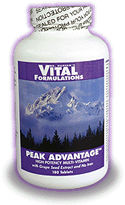Your Supplements are in danger. Please sign this PETITION to keep the FDA from making all nutritional and herbal supplements drugs.
On July 1, 2011, the US Food and Drug Administration (FDA) issued proposed guidelines for New Dietary Ingredients (NDI). The FDA wants to turn your supplements into drugs so that they can seize more power and the billions of dollars that come with it. If it had the power, the FDA would treat everything as a drug and require the full drug approval process, no matter what it does for cost or availability.
The FDA already has the power to pull from the market any supplement, if it is unsafe, or does not comply with Good Manufacturing Practices, etc. The oft-repeated claim that the supplement market is unregulated is blatantly false. But the FDA cannot pull a supplement arbitrarily. It must show cause. What we don’t want is for the FDA to have the power to ban all new supplements arbitrarily. We fear that they will use this power to ban any supplement innovation unless the supplement is turned into a drug and brought through the drug approval process.
Since nobody can afford to pay for the new drug approval process unless the substance is patented, and since supplements generally already exist in nature and cannot therefore be patented, to require full new drug approval is to ensure that there will be no new supplements. This should suit the drug industry very well and, based on past behavior, the FDA as well.
In 1994 the Dietary Supplement Health and Education Act (DSHEA) was enacted by Congress to give the FDA specific limited authority to regulate the supplement industry. Since that time manufacturers have had very little guidance from the FDA on what counts as an NDI. The government has arbitrarily ignored or enforced this section of DSHEA, doing as it liked, without spelling out the rules.
Why does this matter? Because when you hear New Dietary Ingredient (NDI), substitute “New Supplement” in your mind. What we are dealing with here is whether the supplement industry is allowed to innovate and create new supplements—and if so, under what rules.
Now, seventeen years after the passage of DSHEA, the FDA has finally come out with draft guidance on NDIs—that is, on new supplements. They had to do this because it was mandated by the recent Food Safety Modernization Act.
We have reviewed the very complicated new regulations in detail. In the hands of an agency charged with regulating supplements fairly—one not hostile to supplements the way FDA is—they might be made to work. But in the hands of the FDA, which wants everything, supplements and drugs alike, to go through the vastly expensive new drug approval process, we fear the new rules will be used to forbid the development or sale of any new supplements—where “new” means anything after 1994, when DSHEA was passed.
Please note that many important supplements sold today were developed after 1994. Others the FDA will say were developed after 1994, even though they are just variants of what was “grandfathered” by DSHEA. For example, the FDA has already banned a critical form of vitamin B6, pyridoxamine, because that particular form of B6 couldn’t be shown to have been sold prior to 1994, even though B6 in general was certainly sold prior to 1994.
There are many other important new supplements that could be banned depending on how the NDI process is run. We won’t mention the names because to do so would be to put a target on their back. But we can assure you they are important and many of you are taking them.
FDA: We Will Decide What Supplements Can Be Sold
By turning what was meant to be a pre-market notification system into a pre-approval system, the FDA becomes the ultimate arbiter of what dietary supplements will and will not be available.
The FDA does this by simply not “filing” (which means accepting) any NDI notifications they don’t like. It may be because the notification does not meet rigid FDA specifications. Or it may be for any reason, however arbitrary.
 DSHEA: Supplements Are Not Drugs or Food Additives
DSHEA: Supplements Are Not Drugs or Food Additives
Built into the Federal Food, Drug, and Cosmetic Act (FD&C) are pre-approval food additive provisions. But under DSHEA, dietary ingredients were intentionally exempt from those food additive provisions, to ensure that the FDA would not ban new supplement dietary ingredients as illegal unapproved food additives.
Moreover, in the Congressional Record of August 13, 1994, the DSHEA authors explain the purpose of DSHEA is to “clarify that dietary supplements are not drugs or food additives” and that “regulations relating to food additives are not applicable to dietary supplements and their ingredients used for food additive purposes.” Since dietary supplements are also specifically not drugs, it is counter to congressional intent to push the approval standard in the NDI notification closer to the pharmaceutical standard.
According to DSHEA, all dietary ingredients on the market before 1994 are grandfathered in—that is, they are not considered new supplements (NDIs), and are therefore not subject to the NDI notification. But FDA interprets “chemical alteration” very broadly, and so the agency is demanding an NDI notification for every reformulation and every new combination of any dietary ingredient, even those marketed before 1994.
This FDA interpretation essentially ensures that many—and eventually, most—dietary ingredients currently on the market will be considered an NDI, subject to notification, and therefore to disapproval.
This, too, is clearly counter to congressional intent. It sets up supplement manufacturers to fail, and will turn most of them into alleged criminals if they persist in selling supplements not specifically approved by the FDA. At the very least it will cause supplement costs to soar.
Both the FDA proposed NDI guidance and the dangerous Durbin bill (see our new article on Durbin in this issue) seek to give the FDA broad new authority to disapprove supplements or supplement ingredients on totally arbitrary grounds, with no rules or standards. If allowed to stand, over time this will drastically reduce the number of supplements and supplement potencies, raise prices substantially, injure our ability to take care of our health, raise healthcare costs, stifle supplement innovation, and cost millions of jobs in the supplement industry.
TO SEND YOUR MESSAGE TO THE FDA AND CONGRESS
Click THIS LINK to go to the Action Alert page. Once there, fill out the form with your name and address, etc., and customize your letter. We have a suggested message for you, but please feel free to add your own comments to the letter.

